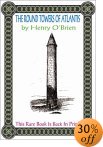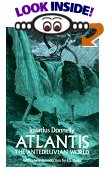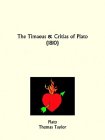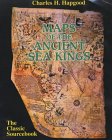|
books about Plato his ‘Atlantis Dialogues’ and commentaries
“The Atlantis Dialogue: Plato’s Original Story of the Lost City, Continent, Empire” Plato, Aaron Shepard (Editor), B. Jowett (Translator)
EU English Edition
“Atlantis was first introduced to world literature by the Greek philosopher Plato in two “dialogues” he wrote in the fourth century B.C. His tale of a great empire that sank beneath the waves has sparked thousands of years of debate over whether Atlantis really existed. But did Plato mean his tale as history, or just as a parable to help illustrate his philosophy?
In this book, you’ll find everything Plato said about Atlantis, in the context he intended. Now you can read and judge for yourself!”
Underwater Discoveries News Archive
“Plato’s Timaeus”
Peter Kalkavage (Translator)
EU English Edition
“A new translation in the Focus Philosophical Library series, with notes and introductory material, glossary and appendix. Especially noteworthy are the extensive discussions in appendices on astronomy, geometry and music. Modern Students can now appreciate the wisdom of the world’s greatest thinkers. Through clear, faithful translations, renowned scholars have made classical philosophical texts accessible and inspirational.”
Underwater Discoveries News Archive
“The Round Towers of Atlantis”
Henry O’ Brien
EU English Edition
“First published in 1834 as “The Round Towers of Ireland” or the “Mysteries of Freemasonry, of Sabaism, and of Budhism”, this book was an instant sensation as one of the first modern studies of Atlantis, round towers, pre-Christian megalithic architecture and secret societies.
In addition to being a sourcebook on Atlantis Research, Druidic Culture and origins of modern Celtic Christianity, the book is a treasure-trove of ancient esoteric lore and arcane knowledge of the past, including: The History of the Tuath-de-Danaans, The Round Towers and Megalithic Crosses of Ireland are pre-Christian, Ireland’s strange connections with ancient India, Persia and China, Ancient Secret Societies and Ireland, Ancient Egyptians and Ireland, Pre-Christian Messiahs, Mithraism, and Ireland, The Connections Between Atlantis and Ireland.”
Underwater Discoveries News Archive
“Atlantis, the Antediluvian World”
Ignatius Donnelly
EU English Edition
“The most important book of its time (1882) on the subject of Atlantis. The author claims there once existed in the Atlantic Ocean, opposite the mouth of the Mediterranean Sea, a large island, which was the remnant of an Atlantic continent, and known to the ancient world as Atlantis, that Atlantis was the region where man first rose from a state of barbarism to civilization, that the gods and goddesses of the ancient Greeks, the Phoenicians, the Hindus, and the Scandinavians were simply the kings, queens, and heroes of Atlantis, that the mythologies of Egypt and Peru represented the original religion of Atlantis, which was sun-worship, etc., etc. Illustrated with photographs.”
“The Destruction of Atlantis: Compelling Evidence of the Sudden Fall of the Legendary Civilization”
Frank Joseph Zecharia Sitchin
EU English Edition
“All human cultures, from classical and biblical to native North and South American, share the myth of an ancient deluge, often coinciding with a rain of fire from the heavens. What accounts for this shared myth of environmental catastrophe? Now, in The Destruction of Atlantis, author Frank Joseph links this worldwide cultural phenomenon to the story of the lost civilization of Atlantis, which in a single day and night disappeared into the sea in a violent cataclysm. In the most comprehensive account of this legendary island, Joseph provides compelling evidence that Atlantis was at the root of all subsequent human civilizations.”
|
One of our tribe, either because he thought so or to please Critias, said that in his judgment Solon was not only the wisest of men, but also the noblest of poets. The old man, as I very well remember, brightened up at hearing this and said, smiling: Yes, Amynander, if Solon had only, like other poets, made poetry the business of his life, and had completed the tale which he brought with him from Egypt, and had not been compelled, by reason of the factions and troubles which he found stirring in his own country when he came home, to attend to other matters, in my opinion he would have been as famous as Homer or Hesiod, or any poet. And what was the tale about, Critias? said Amynander. About the greatest action which the Athenians ever did, and which ought to have been the most famous, but, through the lapse of time and the destruction of the actors, it has not come down to us. Tell us, said the other, the whole story, and how and from whom Solon heard this veritable tradition. He replied: In the Egyptian Delta, at the head of which the river Nile divides, there is a certain district which is called the district of Sais, and the great city of the district is also called Sais, and is the city from which King Amasis came. The citizens have a deity for their foundress; she is called in the Egyptian tongue Neith, and is asserted by them to be the same whom the Hellenes call Athene; they are great lovers of the Athenians, and say that they are in some way related to them. To this city came Solon, and was received there with great honour; he asked the priests who were most skilful in such matters, about antiquity, and made the discovery that neither he nor any other Hellene knew anything worth mentioning about the times of old. On one occasion, wishing to draw them on to speak of antiquity, he began to tell about the most ancient things in our part of the world-about Phoroneus, who is called “the first man,” and about Niobe; and after the Deluge, of the survival of Deucalion and Pyrrha; and he traced the genealogy of their descendants, and reckoning up the dates, tried to compute how many years ago the events of which he was speaking happened. Thereupon one of the priests, who was of a very great age, said: O Solon, Solon, you Hellenes are never anything but children, and there is not an old man among you. Solon in return asked him what he meant. I mean to say, he replied, that in mind you are all young; there is no old opinion handed down among you by ancient tradition, nor any science which is hoary with age. And I will tell you why. There have been, and will be again, many destructions of mankind arising out of many causes; the greatest have been brought about by the agencies of fire and water, and other lesser ones by innumerable other causes. There is a story, which even you have preserved, that once upon a time Paethon, the son of Helios, having yoked the steeds in his father’s chariot, because he was not able to drive them in the path of his father, burnt up all that was upon the earth, and was himself destroyed by a thunderbolt. Now this has the form of a myth, but really signifies a declination of the bodies moving in the heavens around the earth, and a great conflagration of things upon the earth, which recurs after long intervals; at such times those who live upon the mountains and in dry and lofty places are more liable to destruction than those who dwell by rivers or on the seashore. And from this calamity the Nile, who is our never-failing saviour, delivers and preserves us. When, on the other hand, the gods purge the earth with a deluge of water, the survivors in your country are herdsmen and shepherds who dwell on the mountains, but those who, like you, live in cities are carried by the rivers into the sea. Whereas in this land, neither then nor at any other time, does the water come down from above on the fields, having always a tendency to come up from below; for which reason the traditions preserved here are the most ancient. The fact is, that wherever the extremity of winter frost or of summer does not prevent, mankind exist, sometimes in greater, sometimes in lesser numbers. And whatever happened either in your country or in ours, or in any other region of which we are informed-if there were any actions noble or great or in any other way remarkable, they have all been written down by us of old, and are preserved in our temples. Whereas just when you and other nations are beginning to be provided with letters and the other requisites of civilized life, after the usual interval, the stream from heaven, like a pestilence, comes pouring down, and leaves only those of you who are destitute of letters and education; and so you have to begin all over again like children, and know nothing of what happened in ancient times, either among us or among yourselves. As for those genealogies of yours which you just now recounted to us, Solon, they are no better than the tales of children. In the first place you remember a single deluge only, but there were many previous ones; in the next place, you do not know that there formerly dwelt in your land the fairest and noblest race of men which ever lived, and that you and your whole city are descended from a small seed or remnant of them which survived. And this was unknown to you, because, for many generations, the survivors of that destruction died, leaving no written word. For there was a time, Solon, before the great deluge of all, when the city which now is Athens was first in war and in every way the best governed of all cities, is said to have performed the noblest deeds and to have had the fairest constitution of any of which tradition tells, under the face of heaven. Solon marvelled at his words, and earnestly requested the priests to inform him exactly and in order about these former citizens. You are welcome to hear about them, Solon, said the priest, both for your own sake and for that of your city, and above all, for the sake of the goddess who is the common patron and parent and educator of both our cities. She founded your city a thousand years before ours, receiving from the Earth and Hephaestus the seed of your race, and afterwards she founded ours, of which the constitution is recorded in our sacred registers to be eight thousand years old. As touching your citizens of nine thousand years ago, I will briefly inform you of their laws and of their most famous action; the exact particulars of the whole we will hereafter go through at our leisure in the sacred registers themselves. If you compare these very laws with ours you will find that many of ours are the counterpart of yours as they were in the olden time. In the first place, there is the caste of priests, which is separated from all the others; next, there are the artificers, who ply their several crafts by themselves and do not intermix; and also there is the class of shepherds and of hunters, as well as that of husbandmen; and you will observe, too, that the warriors in Egypt are distinct from all the other classes, and are commanded by the law to devote themselves solely to military pursuits; moreover, the weapons which they carry are shields and spears, a style of equipment which the goddess taught of Asiatics first to us, as in your part of the world first to you. Then as to wisdom, do you observe how our law from the very first made a study of the whole order of things, extending even to prophecy and medicine which gives health, out of these divine elements deriving what was needful for human life, and adding every sort of knowledge which was akin to them. All this order and arrangement the goddess first imparted to you when establishing your city; and she chose the spot of earth in which you were born, because she saw that the happy temperament of the seasons in that land would produce the wisest of men. Wherefore the goddess, who was a lover both of war and of wisdom, selected and first of all settled that spot which was the most likely to produce men likest herself. And there you dwelt, having such laws as these and still better ones, and excelled all mankind in all virtue, as became the children and disciples of the gods. Many great and wonderful deeds are recorded of your state in our histories. But one of them exceeds all the rest in greatness and valour. For these histories tell of a mighty power which unprovoked made an expedition against the whole of Europe and Asia, and to which your city put an end. This power came forth out of the Atlantic Ocean, for in those days the Atlantic was navigable; and there was an island situated in front of the straits which are by you called the Pillars of Heracles; the island was larger than Libya and Asia put together, and was the way to other islands, and from these you might pass to the whole of the opposite continent which surrounded the true ocean; for this sea which is within the Straits of Heracles is only a harbour, having a narrow entrance, but that other is a real sea, and the surrounding land may be most truly called a boundless continent. Now in this island of Atlantis there was a great and wonderful empire which had rule over the whole island and several others, and over parts of the continent, and, furthermore, the men of Atlantis had subjected the parts of Libya within the columns of Heracles as far as Egypt, and of Europe as far as Tyrrhenia. This vast power, gathered into one, endeavoured to subdue at a blow our country and yours and the whole of the region within the straits; and then, Solon, your country shone forth, in the excellence of her virtue and strength, among all mankind. She was pre-eminent in courage and military skill, and was the leader of the Hellenes. And when the rest fell off from her, being compelled to stand alone, after having undergone the very extremity of danger, she defeated and triumphed over the invaders, and preserved from slavery those who were not yet subjugated, and generously liberated all the rest of us who dwell within the pillars. But afterwards there occurred violent earthquakes and floods; and in a single day and night of misfortune all your warlike men in a body sank into the earth, and the island of Atlantis in like manner disappeared in the depths of the sea. For which reason the sea in those parts is impassable and impenetrable, because there is a shoal of mud in the way; and this was caused by the subsidence of the island. I have told you briefly, Socrates, what the aged Critias heard from Solon and related to us. And when you were speaking yesterday about your city and citizens, the tale which I have just been repeating to you came into my mind, and I remarked with astonishment how, by some mysterious coincidence, you agreed in almost every particular with the narrative of Solon; but I did not like to speak at the moment. For a long time had elapsed, and I had forgotten too much; I thought that I must first of all run over the narrative in my own mind, and then I would speak. And so I readily assented to your request yesterday, considering that in all such cases the chief difficulty is to find a tale suitable to our purpose, and that with such a tale we should be fairly well provided. And therefore, as Hermocrates has told you, on my way home yesterday I at once communicated the tale to my companions as I remembered it; and after I left them, during the night by thinking I recovered nearly the whole it. Truly, as is often said, the lessons of our childhood make wonderful impression on our memories; for I am not sure that I could remember all the discourse of yesterday, but I should be much surprised if I forgot any of these things which I have heard very long ago. I listened at the time with childlike interest to the old man’s narrative; he was very ready to teach me, and I asked him again and again to repeat his words, so that like an indelible picture they were branded into my mind. As soon as the day broke, I rehearsed them as he spoke them to my companions, that they, as well as myself, might have something to say. And now, Socrates, to make an end my preface, I am ready to tell you the whole tale. I will give you not only the general heads, but the particulars, as they were told to me. The city and citizens, which you yesterday described to us in fiction, we will now transfer to the world of reality. It shall be the ancient city of Athens, and we will suppose that the citizens whom you imagined, were our veritable ancestors, of whom the priest spoke; they will perfectly harmonise, and there will be no inconsistency in saying that the citizens of your republic are these ancient Athenians. Let us divide the subject among us, and all endeavour according to our ability gracefully to execute the task which you have imposed upon us. Consider then, Socrates, if this narrative is suited to the purpose, or whether we should seek for some other instead.”
extracts from Plato’s Critias Dialogue |
Ancient Mysteries Bookshoppe
for a wide selection of books that challenge orthodox views of prehistory on our planet
“Quest for the Lost Civilisation: The Trilogy”
with Graham Hancock
VHS NTSC version (USA and Canada)
VHS UK PAL version (UK and Europe)
“Plato’s Natural Philosophy: A Study of the Timaeus-Critias”
Thomas Kjeller Johansen
EU English Edition
“The Timaeus-Critias is concerned with cosmology and Plato’s claim that its central task is to articulate the way in which the cosmos manifests the values of goodness and beauty. This book examines this important dialogue in its entirety using current methods of Platonic scholarship. Arguing that Aristotle’s physics is far closer to the Timaeus than usually realized, the study’s other prominent findings reinforce the dialogue’s essentially moral message, and clarify its literary character.”
“The Timaeus & Critias of Plato 1810 “
Plato, Thomas Taylor
EU English Edition
“An accurate translation of two Plato works, Thomas Taylor was considered the most noted translator and scholar of Greek philosophy in the 18th century. For the serious student of symbolism, The Timaeus provides an invaluable key to ancient cosmologies and gives the philosophic pattern and psychological meaning underlying the world mythologies. The Critias is an account of the lost island of Atlantis and of the deluge referred to in the history of many ancient peoples, notably the Mayans.”
“Maps of the Ancient Sea Kings: Evidence of Advanced Civilization in the Ice Age”
Charles H. Hapgood
EU English Edition
“Charles Hapgood’s classic book on ancient maps produces evidence of an advanced world-wide civilization existing many thousands of years before ancient Egypt. He has found the evidence in the Piri Reis Map that shows Antarctica, the Hadji Ahmed map, the Oronteus Finaeus and other amazing maps. Hapgood concluded that these maps were made from more ancient maps from the various ancient archives around the world, now lost.
Not only were these unknown people more advanced in mapmaking than any other prior to the 18th century, it appears they mapped all the continents. The Americas were mapped thousands of years before Columbus and Antarctica was mapped once its coasts were free of ice.”
|











